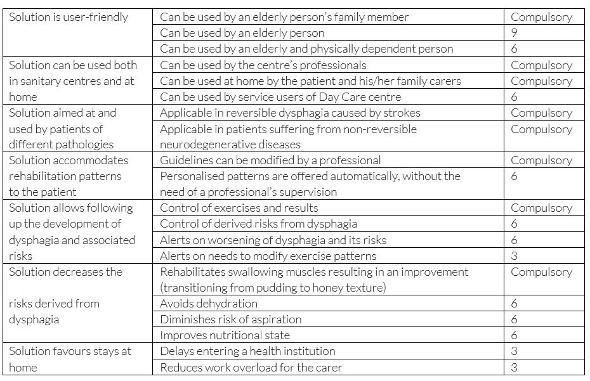Internationale Partnersuche
Innovation & Technologie Anfrage
Tackling dysphagia through rehabilitation and diet
Country of Origin: Spain
Reference Number: TRES20211117001
Publication Date: 19 November 2021
Summary
A Basque (north of Spain) sanitary services provider has launched a challenge through an open-innovation platform: Reduce the risks derived from treating dysphagia just through diet guidelines and focus on new techniques that are complementary to rehabilitation measures and diets. The organisation envisages a research cooperation agreement to solve this problem.
Description
The company behind the profile manages nursing homes and care facilities for the elderly in the region is Biscay (Basque Country).
Dysphagia means difficulty in swallowing. Typical symptoms include: regurgitating food to the nose, coughing during or right after swallowing, changes in the quality of speech, etc.
The main risk of dysphagia is the possibility of aspiration; the intake of solid or liquid food in the respiratory track which can develop a pneumonia and on a worst-case scenario, can cause choking. In the medium to long term, this alteration may compromise the affected individual`s health as it can bring about dehydration and malnutrition.
The current treatment for dysphagia is diet adaptation which provides a safer swallowing by thickening liquids and modifying food textures. There are three levels of viscosity: nectar, honey and pudding. The quantity given in each intake or spoonful is crucial and must adapt to the degree of the dysphagia in a patient.
The efficacy of diet adaptation has been questioned by studies as these modifications can be associated to dehydration and malnutrition issues and to the delay in drugs’ effectiveness which implies a worsening in the patient’s quality of life.
The other treating pillar is that of rehabilitation techniques. Exercises that train a series of muscles are required. These increase the movement of the tongue and lips which altogether improve the formation of the alimentary bolus just before swallowing. There are common guidelines and treatments such as: body posture strategies, sensory stimuli, neuromuscular practice and specific swallowing moves.
At present, studies show that the combination of adapted diet plus rehabilitation exercises is the most efficient way for overcoming this condition.
This challenge is focused on the rehabilitation pillar for the treatment of dysphagia. New techniques that may complement current treatments and that ensure the elimination and/or decrease of the potential risks derived from their application are sought.
There is a table attached as an image that shows the variables and functional needs of the possible solutions. Their importance is ranked from 3-lowest to 9-highest. Some are compulsory.
A tool for identification, treatment and follow up of the condition is expected. The winning candidate and the Basque company will carry out a pilot project under a research cooperation agreement.
An information link will be provided to interested candidates upon reception of EOIs. Submission: 19 Nov-12 Jan 2022.

Expertise sought
The partner in mind must be a specialist in treating this condition: swallowing, non-swallowing exercises, therapeutic interventions, shaker exercises, etc.
The prospective partner must also be familiar with dysphagia evaluation tools such as: imaging (ultrasound, video fluoroscopy, fiberoptic endoscopic evaluation of swallowing (with or without sensory testing and non-imaging.
Requested partner
The Basque provider is willing to work directly with hospitals, private hospitals, physiotherapy outlets and clinics.
Other possible partners are: Care services providers, either private or public and third sector associations that generate support networks to tackle these kinds of health problems for the elderly.
The prospective partner will have to develop a pilot project together with the Basque organization. The viability of the solution will be tested in a real environment with real users. The investment for the pilot will have a cost of €15,000 – €20.000 and will be financed by the Basque organization.
The challenge pursues achieving a tool that allows identification, treatment and follow up of the evolution of patients at any stage of the condition. The final objectives are: improve the patients’ quality of life, optimise their nutritional estate (avoid dehydration and risk of aspiration), offer personalised patterns and rehabilitate reversible cases.
Cooperation offer ist closed for requests

